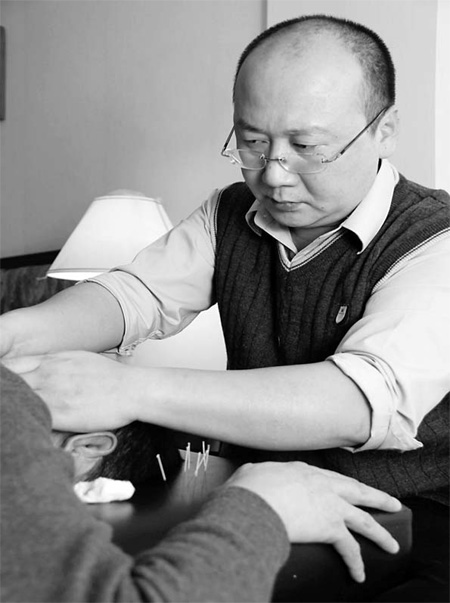
|
 Gao Jiajun, a TCM doctor from Taiwan, performs acupuncture for a patient on Monday.[China Daily/ Zhu Xingxin] |
Taiwan TCM doctor builds on right choice for mainland work
FUZHOU: Gao Jiajun performs magic with his hands.
Sometimes they are gentle, carefully handling a 5-cm needle on the patient's acupuncture point. Sometimes they are powerful, pressing, massaging and working the patient's head.
| ||||
Qi translates into "energy flow" in English. Theories of traditional Chinese medicine say that the body has natural patterns of qi that circulate in channels within the body called meridians.
"I am almost recovered. I visited numerous hospitals and doctors in vain over the past three to four years, until I found Doctor Gao. He is magical," the 60-year-old Lin Shuliang said excitedly as he lay in the doctor's physiotherapy couch.
Gao smiled when he heard his patient's praises.
As one of the first Taiwan residents employed by a mainland public institution, Gao, a famous doctor and respectable medical lecturer, said his fate was changed through luck of a draw.
"My mother said it was providence," said the 36-year-old Gao, who has almost lost his Taiwan accent after studying and living on the mainland for 13 years.
Gao was originally planning to go to the United Kingdom to study law after completing his military service in Taiwan in 1997.
But his mother encouraged him to go to the mainland and study traditional Chinese medicine (TCM), as she thought it would be more useful for him.
"I had no idea about the mainland then, as my father seldom talked about it. All I knew was that the Kuomintang lost the civil war and my father fled to Taiwan with my grandma and aunt from our hometown in Shandong province. And our textbooks said our mainland compatriots were living in extreme misery," Gao said.
His mother had to pray in a Mazu temple for direction to her son's next step. The divination from Mazu, the goddess of the sea and widely believed by people in Taiwan and southeast costal regions of the mainland, said Gao should cross the Straits to learn herbal medicine, which would be "very promising for him". On the other hand, going to the UK would be "like stepping on other people's land and would not be good for him".
Following the divination, Gao packed his bags early one morning and left his hometown in Nantou county for Taichung city, where he flew to Fuzhou, Fujian province, via Hong Kong.
"When I arrived at night, the whole city was in darkness and looked like a disserted battlefield," Gao said.
He has since witnessed how Fuzhou, along with the entire mainland, boomed at an unbelievable speed over the past decade.
"My father was in the advanced stages of cancer in 1987 when Taiwan approved veterans to return to the mainland and visit families. So he did not realize the dream of going back to his hometown," Gao said.
Now it takes Gao less than two hours to directly fly from Fuzhou to Taichung, after the mainland and Taiwan signed agreements to start direct links of flights, shipping and mail in late 2008.
Mazu's divination did not disappoint Gao. As soon as he started studying, he found profound interests for TCM.
"When I just started learning acupuncture, I was so obsessed I couldn't help puncturing everything to practice. My cushion on the bed was full of needles and I tested my skills on my own body," Gao said.
A professional herbal doctor is expected to master acupuncture, massage, cupping and be able to recite at least 390 major acupuncture points over a human's body, more than 320 kinds of TCM materials and more than 400 prescriptions.
After finishing his five-year undergraduate course in the Fujian University of TCM, Gao continued to pursue postgraduate and doctoral degrees in the Beijing University of Chinese Medicine (BUCM). He even skipped a grade due to excellent academic performance.
Gao got his doctor's certification in 2007 but faced another problem.
As Taiwan education authorities did not recognize the medical school diploma provided by mainland universities, Gao could not get a doctor's license. On the other hand, no public institution on the mainland was allowed to employ Taiwan people.
Luck, however, appeared in May 2009 when the central government approved Fujian province as an "experimental region" for cross-Straits exchanges and cooperation. In line with a favorable policy, Fujian University of TCM employed Gao as the first Taiwan lecturer.
Besides his career, Gao also found his partner on the mainland. He fell in love with Taiwan girl Ivy when they both studied in BUCM and they now plan to start a business focusing on Chinese-style health preserving techniques in Fuzhou this year.
Gao said he was like a gambler who put a stake on the openness and cooperation of cross-Straits relations. It was people like him that subsequently attracted more Taiwan people to find their value on the mainland.
"I witnessed a most amazing development of mainland and cross-Straits ties, and I bet prospects will be even more promising in the future," he said.